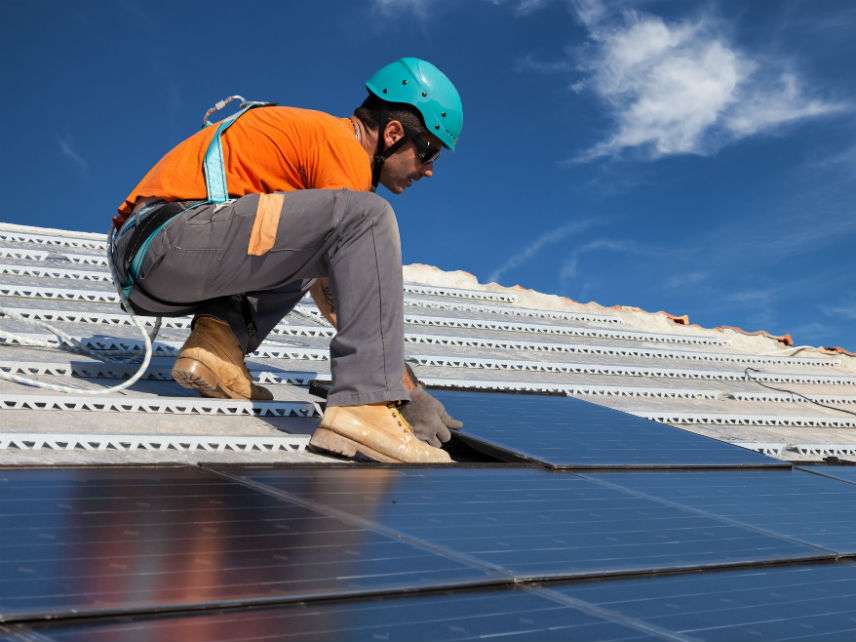Trump Launches Solar Panel Trade War with China
Will the economic and social benefits of the solar panel tariffs outweigh their costs? Not likely.

The Trump administration is imposing a 30 percent tariff on solar panels and modules imported from China. The first 2.5 gigawatts of imported solar cells will be exempted from the tariff. The tariff will drop 5 percent per year falling to 25, 20, and 15 percent in the second, third, and fourth years respectively. Largely due to the import surge of lower-priced solar panels, 25 U.S. solar panel manufacturers have gone out of business since 2012.
Last year, solar panel manufacturers Suniva and SolarWorld filed Section 201 the Trade Act of 1974 petitions at the International Trade Commission (ITC) arguing that Chinese imports constituted a "substantial cause of serious injury" to their businesses. Interestingly, a Section 201 finding does not require a finding of an unfair trade practice, as do the antidumping and countervailing duty laws; merely losing to competition is enough.
The ITC subsequently determined that the increased imports of Chinese solar panels were indeed a substantial cause of serious injury to domestic producers. Under Section 201, factors supporting a finding of serious injury include idle or shuttered production facilities, layoffs and other termination of employment, and a decrease in the financial performance of domestic producers.
The Trade Act also requires that any action taken by the U.S. government must facilitate a positive adjustment to import competition and provide greater economic and social benefits than costs. It is worth noting that the ITC issued a report last year that found that removing current significant import restraints, e.g., tariffs and quotas, would increase annual U.S. welfare by $3.3 billion per year by 2020.
Will solar tariffs save or create American jobs? The Utility Dive industry newsletter reports:
[The Solar Energy Industries Association] estimates the job losses will number 23,000 for this year, and result in "billions lost in investment." SEIA President Abigail Hopper condemned Trump's decision in a statement.
"While tariffs in this case will not create adequate cell or module manufacturing to meet U.S. demand, or keep foreign-owned Suniva and SolarWorld afloat, they will create a crisis in a part of our economy that has been thriving, which will ultimately cost tens of thousands of hard-working, blue-collar Americans their jobs," she said.
The majority of the current 260,000 solar jobs are in installation, with only 38,000 (or 14%) in manufacturing. Moreover, the case threatened two-thirds of future utility-scale solar installations set to come online in the next five years, which is the biggest and most vulnerable solar market.
It is true that the Chinese solar panel manufacturers have received lots of subsidies, so too has the U.S. industry. Overall the U.S. solar power industry has benefited from tens of billions of dollars in subsidies, loan guarantees, tax credits, and state renewable portfolio standards that require utilities to sell a specified percentage or amount of renewable electricity to its customers. Note again that the ITC did not find that the Chinese solar panel companies are "dumping," that is, selling their products below their manufacturing costs.
Analysts like Information Technology and Innovation Foundation's Stephen Ezell warn that the Chinese government is pursuing a policy of "innovation mercantilism" that aims to make China "competitive across virtually all advanced-technology industries and that the techniques it is using to become so pose a direct, even existential threat to America's high-tech industries along with foreign counterparts." Ezell further asserts that "China fundamentally rejects the notion of comparative advantage and instead seeks absolute advantage." If that's true, should we be worried? Not really.
Basically, the idea of comparative advantage is that each country should specialize in producing and exporting only those goods and services which it can produce more efficiently (at lower opportunity cost) than other goods and services (which it should import). Nineteenth century economist David Ricardo illustrated comparative advantage using the example of wine and cloth production in England and Portugal. As Policonomics explains:
Portugal can produce cloth and wine with fewer inputs than England. However, for Portugal the opportunity cost of producing wine is lower than that of producing cloth, whereas, in the case of England the opportunity cost of producing cloth is lower than of wine. If Portugal specializes in producing wine and imports cloth, and England specializes in producing cloth and import wine, both countries could make the most of its comparative advantage.
If Ezell is right, China is somehow seeking to incur no opportunity costs, that is, the country's leaders apparently believe that they can create a world in which China produces everything while giving up nothing. Really? Perhaps when robots make everything for "free" then no trade between countries or people will be necessary.
The current handwringing over China is reminiscent of the Japan As Number One: Lessons for America hysteria of the 1980s. It turned out that Japan's rapid growth was was driven by financial leverage and overinvestment. Property values and share prices soared. The Nikkei Stock Market Index peaked at over 38,000 points in 1990 and declined slowly to under 8,000 during the Great Recession. It is currently at around 23,000 points. Since the mid-1990s, Japanese GDP has grown by less than 20 percent whereas U.S. GDP rose by nearly 60 percent.
Like Japan before it, China is currently pursuing credit-fueled growth as it practices "innovation mercantlism." The ultimate results are likely to mirror what has happened to Japan.
Will the economic and social benefits of the solar panel tariffs outweigh their costs? It's hard to tell for sure given the labyrinthine complications of energy and tax policy. Let's just get rid of all subsidies to all energy technologies and see if solar power advocates' claims that it is as cheap as conventional power are true. In the meantime, the Trump administration's new tariffs will not save or create more American jobs; it will do the opposite.


Show Comments (72)